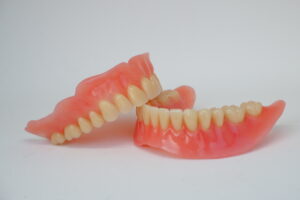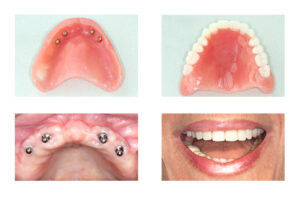Does Wearing Dentures Affect Nutrition?
One of the purposes of wearing dentures to replace missing teeth is to reestablish one’s ability to chew food. Without any teeth, people are very limited in their food choices and often resort to a soft diet. While meal replacements and supplements abound, nutritionists know that the best nutrient absorption comes through obtaining your necessary nutrients, including vitamins and minerals, through chewing natural food.
Teeth, obviously, are instrumental in this process, but what happens when you don’t have any teeth?
How Traditional Dentures Affect Chewing Force
 Traditional dentures are prosthetic teeth held in an acrylic gum-colored base material, and they rest on the gum tissues. Traditional dentures obtain their functional support through their shape and the way they cover the underlying jawbone. The upper denture uses a suction effect on the roof of the mouth to stay in place, and the lower denture requires muscle control.
Traditional dentures are prosthetic teeth held in an acrylic gum-colored base material, and they rest on the gum tissues. Traditional dentures obtain their functional support through their shape and the way they cover the underlying jawbone. The upper denture uses a suction effect on the roof of the mouth to stay in place, and the lower denture requires muscle control.
Traditional dentures are completely removable and do not affix themselves to anything in the patient’s mouth. Many people need to use denture adhesive to help retain them inside the mouth, without becoming loose during eating or speaking.
There are limitations on the chewing force provided by traditional dentures. In order to create stability during chewing, your dentist must “build” the bite in a very specific way, and this way does not allow for good tearing of food with front teeth. In general, it restores the ability to chew side to side on back teeth only.
An analogy that makes this easier to understand is that traditional dentures recreate a bite that is similar to the way a plant-eating animal chews its food, and does not restore the bite necessary for a meat-eater. Natural teeth provide both grinding and tearing ability. Dentures do not.
Most people wearing traditional dentures know that chewy meats are off limits as the prosthetic teeth are unable to tear the meat fibers. Some also find that starchy foods, like bread and potatoes, are difficult to eat because they become sticky during the chewing process and can dislodge the dentures from their optimal position.
The amount of force one can generate with traditional dentures is far less than the forces possible with natural teeth. This means that denture patients often chew their food only partially, swallowing larger particles of food than they should.
How Chewing Force Affects Nutrition
 Many people do not realize that chewing is the first step in the digestive process. The mechanical forces of chewing break the food down into small particle sizes, which are easier for the stomach acids to break down after swallowing. There are also chemical forces provided by enzymes in our saliva that begin breaking down particular molecules in food.
Many people do not realize that chewing is the first step in the digestive process. The mechanical forces of chewing break the food down into small particle sizes, which are easier for the stomach acids to break down after swallowing. There are also chemical forces provided by enzymes in our saliva that begin breaking down particular molecules in food.
Because chewing is sub-optimal in denture wearers, they often swallow larger, undigested food particles that are more difficult for the stomach to process. Swallowing earlier in the chewing process also limits the breakdown provided by salivary enzymes. Studies show that chewing food for shorter periods of time and swallowing larger food particles impairs the body’s ability to absorb the nutrients in that food.
Patients with traditional dentures often suffer from mild to moderate forms of malnutrition for two reasons. One is that their impaired chewing function reduces the body’s ability to absorb the nutrients. The other is that many people, in their frustration with that impaired chewing function, begin removing vital foods from their diets.
Because of the difficulty in chewing meat, many people reduce their meat intake, which can cause a protein deficiency. Unable to bite into an apple or carrot, some suffer from vitamin deficiencies due to a lack of fresh fruits and vegetables.
How Implant-Supported Dentures Affect Chewing Force
 At Designer Smiles, we are big fans of dental implants. We love how they can improve chewing function in patients who have suffered the loss of multiple teeth. When patients lose all of their teeth, dental implants are a helpful way to improve the chewing function in conjunction with traditional dentures.
At Designer Smiles, we are big fans of dental implants. We love how they can improve chewing function in patients who have suffered the loss of multiple teeth. When patients lose all of their teeth, dental implants are a helpful way to improve the chewing function in conjunction with traditional dentures.
Dental implants can support traditional dentures by providing an interlocking connection between the denture and the jawbone. Dr. Ann places the dental implants (usually a minimum of two) into the jawbone underneath the gums. After healing and integration with the bone, she places an abutment that protrudes out of the gum tissues. Abutments come in various sizes and shapes, and we have specific abutments made for connection implants to dentures. The denture has a matching component that snaps onto the abutment, proving a firm secure connection.
This connection provides several advantages that traditional dentures do not have to improve chewing ability. First, they hold the denture in position over the jawbone without any risk of loosening or movement. They also help translate some of the forces the denture receives into the jawbone itself. The jawbone is made for supporting chewing forces. That’s what it does for teeth, and it can do the same for dental implants.
Patients with implant-supported dentures have far better chewing force than those with traditional dentures. This improved chewing force translates into better nutrition throughout the rest of your life. If you have traditional dentures, we may be able to transition you into an implant-supported denture and give you the benefits of better chewing and better nutrition.
More Questions about Dentures?
Call Designer Smiles today to schedule a denture consultation with Dr. Ann. She can answer any questions you have and assess your specific situation to help you determine which is the best treatment option.
